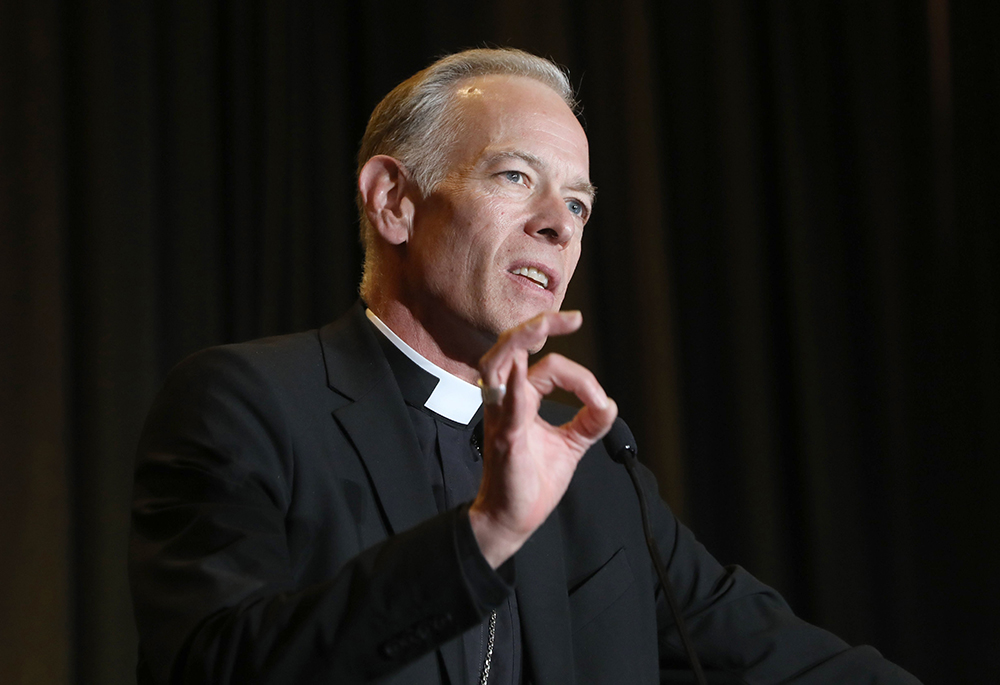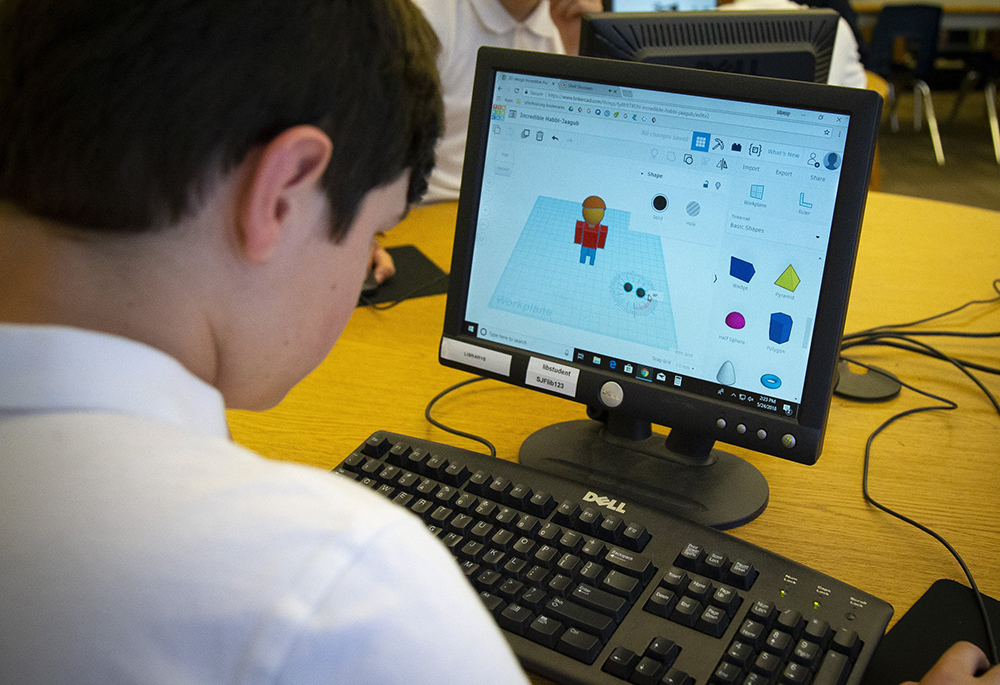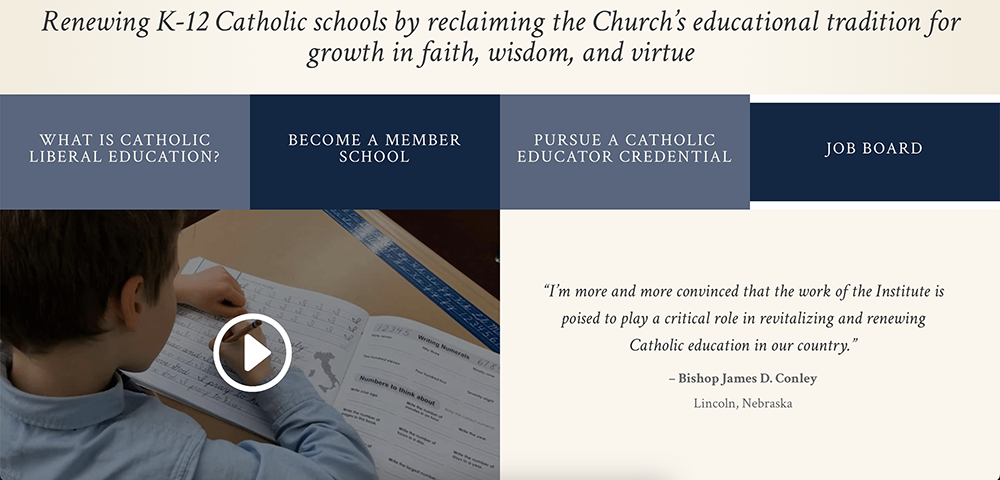
Archbishop Alexander Sample of Portland, Oregon, speaks July 7, 2022, during the Catholic Media Conference in Portland. (CNS/Bob Roller)
Nearly four months after Archbishop Alexander Sample of Portland, Oregon, surprised and baffled the local Catholic community by closing his Department of Catholic Schools and firing the superintendent, the prelate announced he has established an evangelization-focused education office and hired the Denver Archdiocese's superintendent to lead it.
In an Oct. 11 memo to archdiocesan Catholics, Sample said the restructuring offers a "transformational new direction" and is intended to more deeply integrate Catholic schools into the broader evangelizing mission of the archdiocese.
Relocating from Denver, Elias Moo — whose interest in classical education, commitment to evangelization and concerns over "gender identity theory" appear well aligned with Sample's — will be director of Catholic education starting in January 2024 in the newly formed Office for the Mission of Catholic Education.
Numerous parents and educators told NCR that while they are trying to keep an open mind, they worry the changes signal an ongoing shift in the archdiocese.
It's movement toward education "more aligned with pre-Vatican II mores," said Ingrid Parmeter, an art teacher at The Madeleine, a Catholic K-8 school in Portland.
The Catholic schools department, which had supported the more than 15,000 students and 1,300 educators and school staff in western Oregon, was closed this June at the same time hundreds of parents, parishioners and educators expressed frustration over Sample's document on gender identity.
"A Catholic Response to Gender Identity Theory: Catechesis and Pastoral Guidelines" released in January, says students should participate in sports and use names, pronouns, attire and bathrooms that correspond only to their sex as assigned at birth.
It also says no Catholic institutions should post signage or display symbols "in support of gender identity theory."
Though some praised the document, at least two administrators resigned in protest, several teachers chose not to renew their contracts and a number of families withdrew students.
On June 21, a petition with more than 1,000 signatures and an accompanying letter asking for a meeting between Sample and a small group of Catholics were delivered to the pastoral center.
"Many faithful Catholics throughout the Archdiocese of Portland," read the petition, "are profoundly concerned about the consequences of this document, which ignores commonly accepted best practices in education, medicine, psychology, and child development, and has the potential to cause grave harm to an already vulnerable population."
Sample never responded to the letter, several signatories told NCR in October.

A student at St. John Fisher Catholic School in Portland, Oregon, is pictured in a 2018 photo working on the design of a prosthetic hand for underprivileged children. The head of the Archdiocese of Portland in Oregon has refuted media reports that the archdiocese's recent closure of its Catholic schools office is related to a gender identity theory document published by the archdiocese in January. (OSV News/CNS file, Chaz Muth)
The day after the letter was delivered, the archbishop informed pastors he'd closed the schools department. He also eliminated the superintendent and associate superintendent positions.
Some local Catholics speculated the archbishop's actions were tied directly to the letter or to the turmoil around the document. Others told NCR they felt the closure and the guidance were related in that they both reflected Sample's desire to ensure schools were aligned with his vision for the church in the region.
After news of the dismantling drew media attention, the archdiocese posted a statement on its website saying the shuttering was "temporary" and the decision was made in order to "reevaluate how to best integrate schools more fully into our mission." A few days later, the following was added: "The decision is unrelated to the publication of 'A Catholic Response to Gender Identity Theory' or to one school adopting a classical education model."
Sample also issued a statement to "address some inaccurate media reports," saying the changes "are not in any way tied to the Gender Identity Theory document or its related controversy."
Since the closure, a team of principals and archdiocesan staff have assisted the schools.
The archbishop said in his October memo that he is commissioning Moo "to help us renew and reform our Catholic schools and other Catholic educational efforts."
NCR asked Douglas Markwell, director of marketing and communications for the archdiocese, if Moo would oversee parish religious education programs as well as Catholic schools and if he would fulfill all tasks previously managed by the superintendent. Markwell did not respond.
Advertisement
Moo, in a letter included with Sample's announcement, writes that the church's vision and mission for education "is not a model to be implemented or the latest trendy educational fad to be adopted."
"It is our timeless charter and heritage," he wrote, "one that has withstood the test of time over many centuries and is handed on to us today."
A second-generation Mexican American, Moo has master's degrees in education and educational leadership from the University of Notre Dame and spent two years serving students in inner-city Catholic schools after graduating. He also worked to make Catholic schools more affordable in the Denver Archdiocese.
As superintendent, Moo oversaw schools in an episcopate with one of the most sweeping gender identity documents in the country. The Denver guidelines direct administrators not to enroll transgender students and to treat gay parents differently than heterosexual couples.
Moo has endorsed the Person and Identity Project, an initiative of the Catholic Women's Forum at the Ethics and Public Policy Center, a conservative think tank. The project aims to help parishes and schools combat "gender ideology." It features among its resources a list of therapists endorsed by the American College of Pediatricians, which is classified as a hate group by the Southern Poverty Law Center.
In 2020, Moo was among some 600 Catholic leaders and educators on a conference call with former President Donald Trump. Moo urged the former president to pursue policies that support school choice, reported Crux, an online Catholic news organization. According to Catholic News Agency, he also said the significance of the call was not related to politics but about engaging with public officials.
The following year, Moo helped pilot the Institute for Catholic Liberal Education's credential program and was a presenter at the institute's national conference. The California-based organization focuses on "recovering and adapting the classical tradition of liberal education as embraced and developed by the Church," according to its website.

Screenshot of the Institute for Catholic Liberal Education's website (NCR screenshot)
Earlier this year, Catholic Vote ran an article on the institute titled "Catholic Teaching Program Provides Alternative to Woke Licensing Requirements."
About 17% of Catholic schools (four archdiocesan and two independent) in the Denver Archdiocese are members of the organization.
This summer, parents and educators told NCR they believed the institute in part reflects the archbishop's vision for schools in the region.
At the end of last school year, one Portland archdiocesan school was affiliated with the Institute for Catholic Liberal Education. Currently two archdiocesan schools and two new high schools in the archdiocese are listed on the institute website.
In his letter to Portland Catholics, Moo said that his first goal in Oregon is to get to know the community.
"Secondly, and most importantly," Moo wrote, "I plan to spend time in prayer … alongside Archbishop Sample, his leadership team and all of you."
After the archdiocese announced Oct. 11 the school-related changes on X, formerly known as Twitter, Mary Pat Donoghue, executive director of the Secretariat of Catholic Education at the U.S. Conference of Catholic Bishops, posted: "Elias is a faithful and visionary leader. Congratulations to the Archdiocese of Portland!"
But many teachers and parents in Portland echoed concerns articulated by Charlene Hannibal, a parent at All Saints School in Portland. "With Moo's record of someone supporting a conservative model within the Catholic Church," she asked in an NCR interview, "was he hired specifically for his conservative viewpoints?"
Local Catholics said the choice also adds to their fear that the gender identity document, described as "preliminary guidance," is more likely to become a mandate.
Pope Francis remains in line with church teaching on sexuality and gender, said Hannibal, but he "is going above and beyond what other popes have done to help LGBTQ people feel welcome."
"Our leader," she said, referring to Sample, "is going in the opposite direction."




